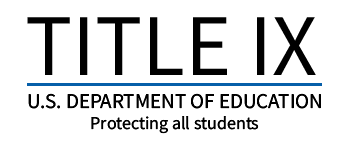Title IX Resources
- Title IX Final Rule
- Title IX Regulations Addressing Sexual Harassment (Unofficial Copy) PDF (6M)
- Title IX: U.S. Department of Education Title IX Final Rule Overview PDF (553K)
- Summary of Major Provisions of the Title IX Final Rule PDF
- Fact Sheet: Final Title IX Regulation
- Questions and Answers Regarding the Department’s Final Title IX Rule
- OCR Webinar: Title IX Regulations Addressing Sexual Harassment (Length: 01:11:29)
- The First Amendment and Title IX: An OCR Short Webinar
- OCR Short Webinar on How to Report Sexual Harassment under Title IX
- Conducting and Adjudicating Title IX Hearings: An OCR Training Webinar
- OCR Webinar on Due Process Protections under the New Title IX Regulations
- OCR Webinar on New Title IX Protections Against Sexual Assault
- OCR Blog: Effective Date and Retroactivity
- OCR Blog: Live Hearings, Excluding Reliance on a Party’s Statements, and Verbal Conduct
- OCR Blog: The Requirement to Update School Websites with Important Title IX Information
If you believe your school, college, or university has violated Title IX, learn more about how to file a complaint with the Department’s Office for Civil Rights. Technical assistance inquiries, including questions regarding compliance with the new Title IX Rule, may be submitted to: OCR@ed.gov.
Fact Sheet: Final Title IX Regulation
1. Recognition of Sexual Harassment as Sex Discrimination
- Sexual harassment under Title IX includes – dating violence, domestic violence, and stalking.
2. Protections for Survivors
- Survivors are in the position of control to decide what happens after an incident of sexual harassment, including sexual assault, occurs.
- Schools must respect a survivor’s decision to file, or not to file, a formal complaint and must offer supportive measures either way.
- Schools must respond promptly in every instance by offering to provide supportive measures like dorm reassignments or class schedule adjustments
- Schools are forbidden from pressuring a survivor into filing or not filing a formal complaint or participating in a grievance process.
- To protect younger students, K-12 schools must respond promptly when any school employee has notice of sexual harassment, including sexual assault.
- The regulation extends to all aspects of a school’s education program or activity and applies to any building owned or controlled by a student organization recognized by a college or university.
- If a survivor chooses to participate in a grievance process, the regulation protects survivors from inappropriately being asked about prior sexual history (also known as “rape shield” protections), and the survivor must not be required to divulge any medical, psychological, or similarly privileged records.
- A survivor never has to come face-to-face with the accused during a hearing, and an accused is never allowed to personally ask questions of a survivor.
- Survivors are protected against retaliation when they choose to report sexual misconduct or not, file a formal complaint or not, participate in a grievance process or not.
- Survivors are protected against bullying or harassment throughout the grievance process.
3. Campus Processes and Procedures
- The regulation provides students with a right to written notice of allegations, the right to an advocate, and the right to submit, examine, and challenge evidence.
- All students have the right to a live hearing where advisors conduct cross-examination.
- All students have the right to an impartial finding based on evidence using a standard of evidence — either the preponderance of evidence standard or the clear and convincing standard — that applies to all members of the school community, including faculty.
- Schools must offer both parties an equal opportunity to appeal the finding.
- The regulation gives schools flexibility to conduct Title IX investigations and hearings remotely.

